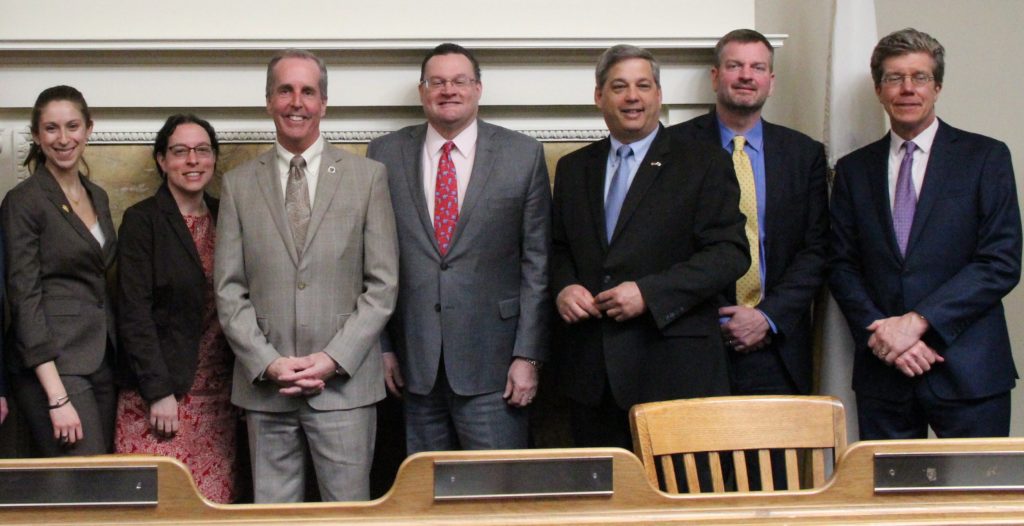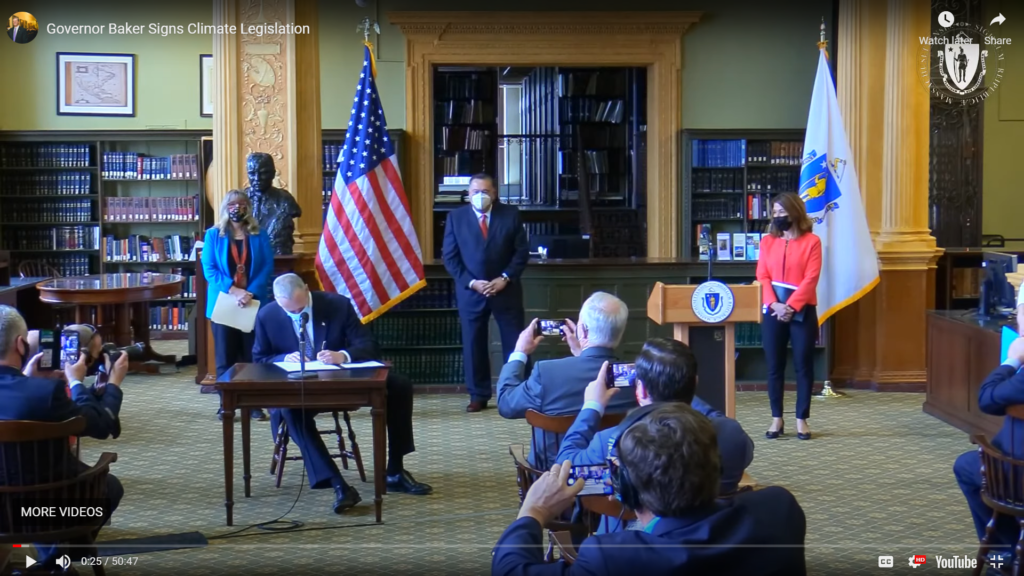Last updated on February 12th, 2024

Climate change is one of the biggest challenges facing the world today. Its impacts can be seen clearly as sea levels continue to rise, heat waves become more frequent and storms intensify. To help avoid some of the worst impacts yet to come, immediate action is needed to not only stop further greenhouse gas emissions, but also to remove the carbon dioxide (CO2) that is already in the air.
In March, Massachusetts passed An Act Creating a Next-Generation Roadmap for Massachusetts Climate Policy, a groundbreaking and ambitious law that sets a net zero emissions goal–the new global standard–and requires the Commonwealth to decarbonize our economy by decreasing our use of fossil fuels and harnessing nature to draw carbon from the air.
“The new law reflects Governor Charlie Baker’s and the state legislature’s recognition that climate change impacts are touching down in the Commonwealth’s communities today, and we need to address the causes and effects to protect our future,” says Steve Long, director of government relations for The Nature Conservancy (TNC) in Massachusetts. “Once again, Massachusetts policymakers have modeled bipartisan collaboration and leadership to address climate change that should serve as inspiration for policymakers on the national stage.”
The law also provides a robust toolkit of policies and strategies—such as requirements and incentives to reduce emissions from energy production, transportation, and buildings—and ensures accountability by setting goals for interim carbon emissions reductions between now and 2050.

TNC led the advocacy for the inclusion of Natural Climate Solutions in the legislation. As the bill moved through the Senate and House of Representatives, we heard bipartisan support for the benefits of Natural Climate Solutions. During Senate floor debate, Senator Jo Comerford (D-Northampton) said, “We will not achieve the reductions we need without carbon sequestration and storage. It is our Commonwealth that has the lungs of New England.” And House Minority Leader Brad Jones (R-North Reading) noted that, “A comprehensive, multi-faceted approach is needed to reduce greenhouse gas emissions. Using forests and other natural and working lands to promote carbon sequestration is one of the most effective ways for the state to achieve its goal of net-zero emissions by 2050.”
Natural Climate Solutions are strategies that protect, restore, and better manage natural and working lands—such as forests, farms, and wetlands—to remove carbon from the air and store it long term. We believe this law is the first in the nation to require the state to set goals for both reducing emissions from and increasing sequestration by natural and working lands, and to create a plan to achieve those goals.

Massachusetts’ forests currently remove the equivalent of nearly five million metric tons of CO2 from the air each year, an amount equal to nearly seven percent of our carbon emissions. Natural Climate Solutions have the potential to remove an additional one to two million metric tons of CO2 equivalent per year across the state—about the same amount of carbon as is emitted by 435,000 cars annually.
In addition to capturing carbon, implementing Natural Climate Solutions can bring communities many other benefits, as well. For example, protecting forests and wetlands helps clean our water and air and provides habitat for wildlife. Better managing farmland ensures healthy soils and can increase agricultural yields. And restoring wetlands and salt marshes helps reduce flood risks and enhances our fisheries. In urban areas, tree planting and creating green space can reduce the heat island effect, lower energy use in nearby buildings and reduce air pollution to improve public health.
As we move forward, it is also critical to ensure a just transition to a decarbonized economy and address the disproportionate impacts of climate change felt by underserved and overburdened communities. The new law includes important environmental justice provisions designed to enhance review of the health and cumulative impacts of projects proposed in communities with environmental justice populations and to ensure that residents have reasonable access and information to meaningfully engage in the public processes concerning those projects. TNC was proud to support environmental justice partners in advocating for these protections.
“The requirement in the new law that cumulative impacts be considered reflects the reality that the health and well-being of our communities and our environment are inextricably linked,” says Eugenia Gibbons, Massachusetts director of climate policy at Health Care Without Harm. “The environmental justice protections mark an important step towards ensuring that communities historically excluded from decision making that has left them burdened by environmental harm have reasonable access to information and an opportunity to engage meaningfully going forward.”
At the same time TNC was advocating for the climate legislation, they led a working group on the state’s climate council to inform the science and policy recommendations for natural climate solutions in the Commonwealth’s 2030 Clean Energy and Climate Plan. The plan prioritizes the state’s action for the next ten years and will guide implementation of strategies to meet emissions reductions targets in the law. TNC collaborated with climate justice partners to jointly develop a policy framework and recommend Natural Climate Solutions strategies for equity and justice.

“The legislation signed by Governor Baker is supported by a comprehensive, science-based analysis with significant stakeholder input that took place over a two-year period, culminating with the Administration’s 2050 Decarbonization Roadmap and Clean Energy and Climate Plan,” says Kathleen Theoharides, Energy and Environmental Affairs Secretary for Massachusetts. “As we move toward implementing this nation-leading legislation, including important provisions around natural working lands and protecting our environmental justice communities, the Baker-Polito Administration remains committed to achieving our climate goals in an equitable manner that protects our most vulnerable residents.”
TNC in Massachusetts could not have realized our accomplishments without a team effort that provided an effective combination of policy and science, which included Steve Long, Laura Marx, forest ecologist and Emily Myron, policy manager.
An Act Creating a Next-Generation Roadmap for Massachusetts Climate Policy is formative legislation that could be emulated across the U.S., bringing people together across the aisle and leading to important and impactful changes for the future of people and nature.
Loren Dowd is a Marketing and Communications Manager at The Nature Conservancy.
